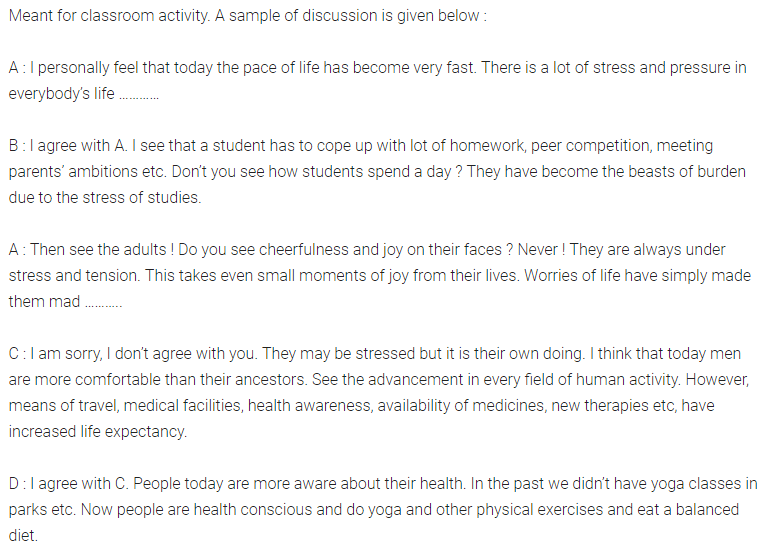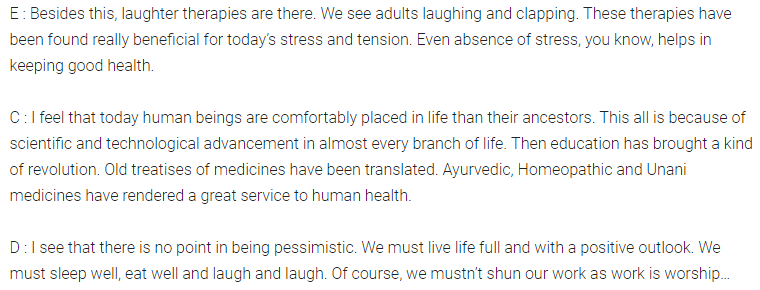NCERT Solutions for Class 10 English Main Course Book Unit 1 Health and Medicine Chapter 1 Do Indians Get Enough Sleep ?
CBSE Class 10 English Main Course Book Unit 1 Health and Medicine Chapter 1 Do Indians Get Enough Sleep ?
Textual Exercises
Question 1.
Now that you have read a substantial part of the feature article, work with your partner and jot down at least five reasons that, according to you, are mainly responsible for Indians today not getting the desired quota of sleep each night. Share your views with other pairs of students in your class.
Answer:
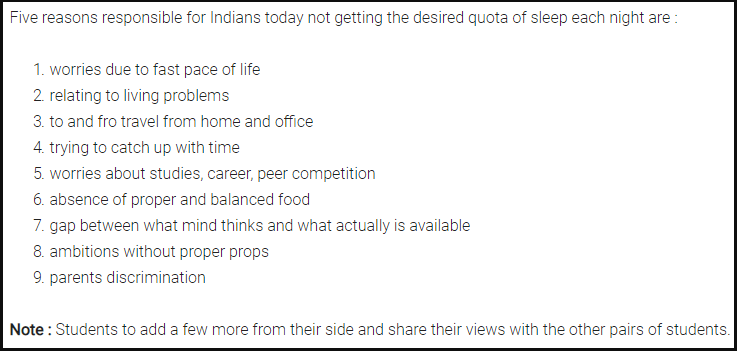
Question 2.
On the basis of your reading of the article, answer the following questions :
(a) The direct result of lack of sleep is _____.
(b) Why is it important for physicians to ‘wake up’ to sleep disorders ? How will it help ?
(c) What do you understand by sleep deficit ? Why does the amount of sleep required to rejuvenate people vary from one person to another ?
(d) Why does the writer refer to the ‘early to bed …’principle ?
Answer:
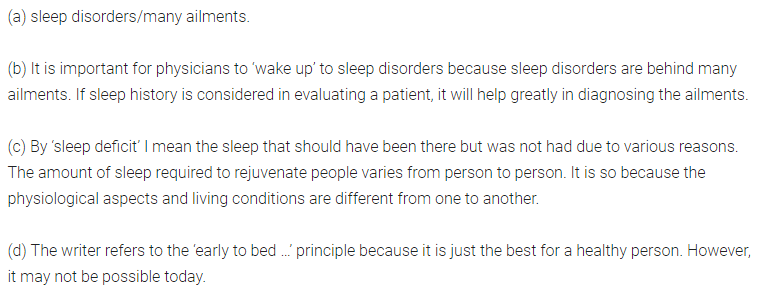
Question 3.
Now, write a letter to your school going younger brother or sister who is sleep deprived. Advise him or her to make life style changes to his/her daily schedule in order to get the desired hours of sleep daily.
Work in pairs and follow the CODER (Collect, Organize, Draft, Edit, Review) steps recommended for writing.
Language Tips :
(a) Remember to use the imperative form of sentences mostly.
E.g. “Drink a lot of water and take at least a fifteen minute stroll after dinner on a regular basis.”
(b) For the sake of introducing variety into your writing, use other forms of sentences making statements or asking questions, but consider the possibility of using modals like “should”, “must”, “may”, “might”, etc or using words or expressions that we usually employ when we advise others.
E.g. “You are recommended / advised to ……………… ”
“You ought to…”
“You must not forget to…”
“It is important to…”
Answer:
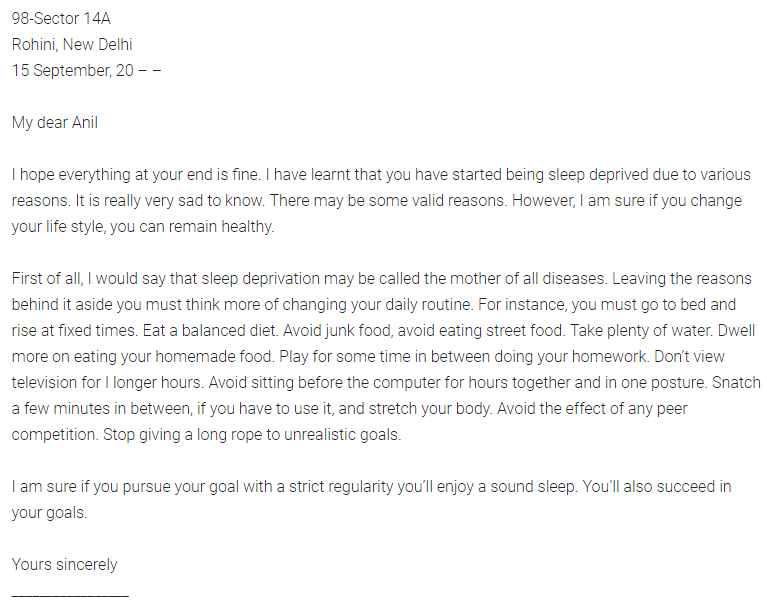
Question 4.
(a) Phrasal verbs are “multi-word verbs”. These verbs consist of a basic verb + another word or words. The other word (s) can be prepositions and/or adverbs that modify or change their meaning. For example ‘give up’ is a phrasal verb that means ‘stop doing’ something, which is very different from ‘give’. In the article that you have just read there are a few phrasal verbs like :
- pull off : Manage to do something difficult or tricky/to steer or turn a vehicle off the road
- roll down : roll down (something) or roll (something) down : to move (something) down especially by turning handle
- head for : to go or cause to go (towards)
- woke up : arose from sleep/realized
Now look through the unit of Health and Medicine, figure out the phrasal verbs that you come across and list them.
Answer:
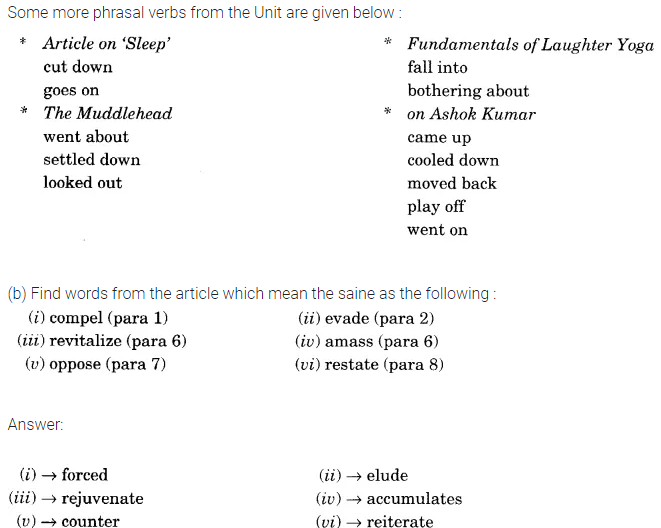
Question 5.
Read the concluding part of the article on whether we get enough sleep these days.
Concluding Part of the Article
SUMMARY
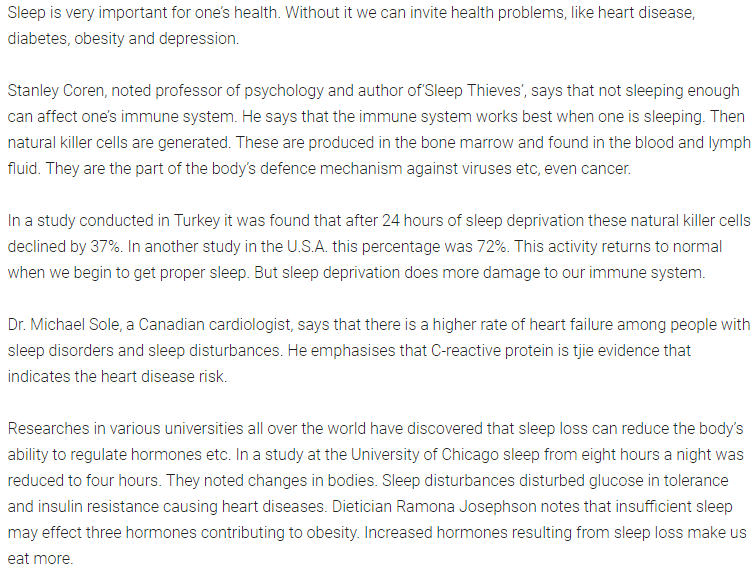

Question 6.
Find the words from the final part of the above article that you have just finished reading which mean the same as the words or group of words given below.
(a) Vital, very important (para 1): (i) _________
(b) the quality of being prone to or open (ii) _________
to dangers, like a disease or infection or a weakness (para 1):
(c) a wide range (para 1) : (iii) _________
(d) very badly in a damaging way (iv) _________
(para 4):
(e) a problem that has persisted for (v) _________
quite some time (para 5):
Answer:
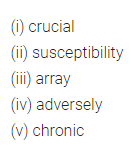
Question 7.
Choose the appropriate options to complete the sentences below.
1. Lack of sleep
(a) decreases laziness.
(b) weakens the body’s capacity to combat diseases.
(c) helps youngsters do well in their examinations.
(d) prevents a person from gaining weight.
2. Natural killer cells
(a) make a person look old pretty quickly.
(b) are produced in large numbers when we stay awake.
(c) help us fight viruses and bacteria.
(d) work well even for sleep-deprived people.
3. C-reactive protein
(a) when produced more in the body causes heart failure.
(b) prevents us from having a good night’s sleep.
(c) helps us to sleep peacefully.
(d) assists in destroying natural killer cells.
4. If we don’t sleep well,
(a) we may lose our appetite.
(b) we may become very thin.
(c) our brain may stop functioning in a balanced manner.
(d) production of brain chemicals increases.
Answer:

Question 8.
Lack of sleep has a direct effect on the production of three hormones and brain neurotransmitters, which in turn has a bearing on our health. Complete the table below to show the above.

Answer:
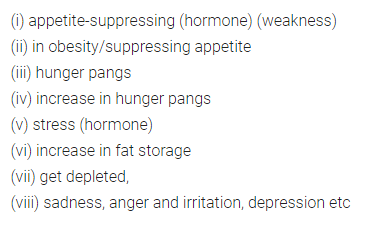
Question 9.
You have read about sleep deprivation and the ill effects it has on human beings. There are other work areas where youngsters remain sleep deprived and fall a pray to ill health. Listen carefully to some of the comments made about the business process outsourcing (BPO) sector which is part of the IT-enabled industry and do the activity. [Page 239 and 240 of Main Course Book]
WORD-NOTES


While you listen, complete the following statements by choosing the right option :
1. According to the speaker, call centre work is insensitive because :
(i) the people cannot go to the toilets and need to concentrate very hard
(ii) the people are expected to attend to all the calls that come through to them
(iii) it requires unflagging concentration throughout the day with minimum breaks for meals or visits to the toilet
(iv) the people are expected to work on the computer all day long
2. People working at call centres are not allowed to leave their desks because :
(i) the managers do not want them to waste time smoking
(ii) they have to attend the calls which come in one after the other
(iii) they have to work at their computers all day long
(iv) they are paid very well
3. The targets that have to be met by the call centre employees have been called unrealistic because :
(i) they have to attend to too many calls in one day
(ii) they have to attend to double the calls than call centre workers in other countries
(iii) it is not humanly possible to attend all the calls that come through to them
(iv) the employees fall sick after working at these places
4. Closed circuit cameras have been installed in these offices to monitor
(i) whether the workers are smoking
(ii) whether the workers are resting at their desks
(iii) whether the workers are attending their calls without wasting a minute
(iv) whether the workers are visiting the toilets too often
5. The statistics about the health problems suffered by these people are
(i) 13%-headaches, 3%-eye fatigue, 23% indigestion and constipation
(ii) 3%-headaches, 13%-eye fatigue, 23% indigestion and constipation
(iii) 23%-headaches, 3%-eye fatigue, 13% indigestion and constipation
(iv) 13%-headaches, 13%-eye fatigue, 23% indigestion and constipation
6. That most people are not happy with their jobs in a call centre can be inferred from the fact that:
(i) they are under constant surveillance
(ii) they have to speak incessantly on the telephone
(iii) they have to stare at the computer screen all day long
(iv) they do not stay in the job for more than three years
Answers:

Question 10.
You have listened to the woes of working in a call centre. There are a number of other jobs which involve health hazards. However, modern advancements and developments in various therapies have improved our living conditions. Given below are different view points. In groups of four, discuss and add to these views :
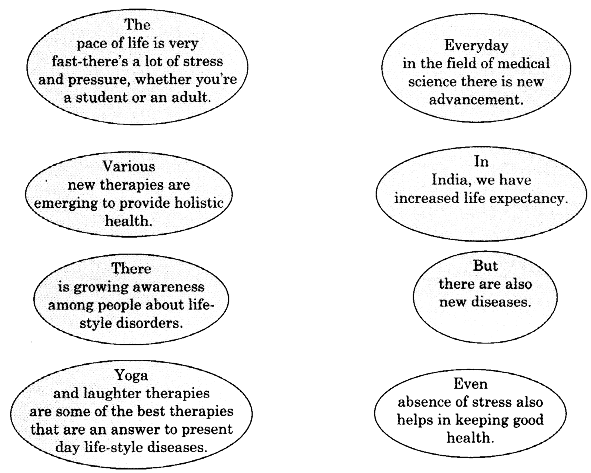
Answer:
